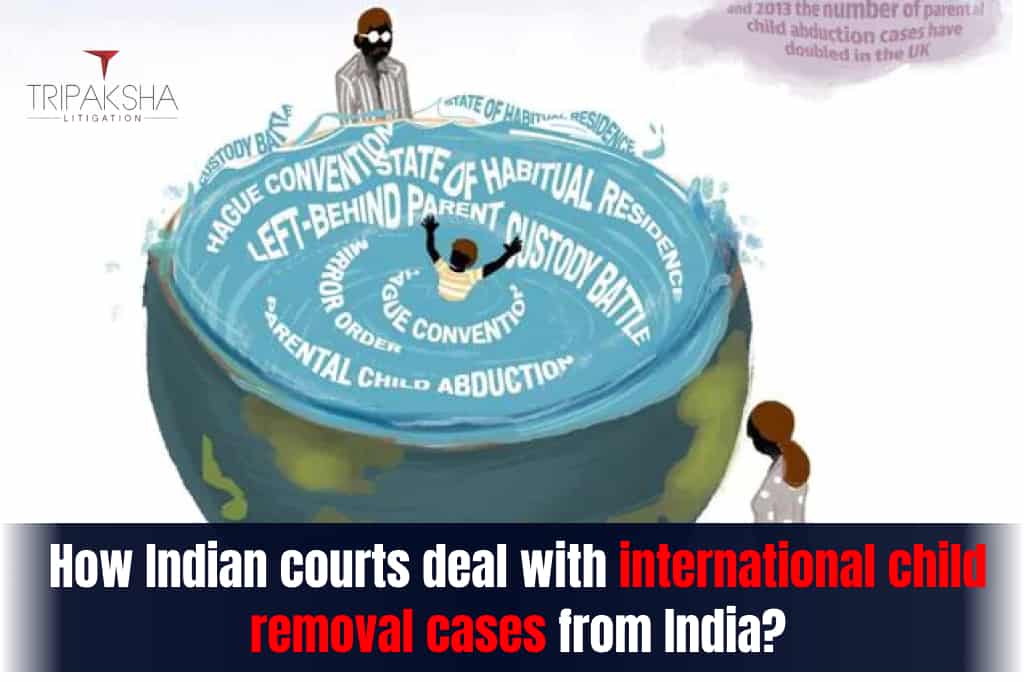INTRODUCTION
In India, there are many cases wherein the issue of child removal from his/her home country to another foreign country by one parent without the consent of another parent. These cases usually arise when one parent takes the child away from their home country without any consent or reasonable cause leaving the other parent behind.
India has not signed Hague Convention on civil aspects of International Child Abduction i.e. if the child is taken from their habitual residence to India without the consent of the left behind parent’s consent then also the left behind parent cannot with the provision of Hague Convention take action against the taking parent in India. The Hague Convention basically aims to initiate that the child to be returned to his or her habitual country and thus the court can make custody orders. Since India is not a signatory in Hague Convention, therefore the left-behind parent has to seek legal action in India under Indian laws and procedures. The court thus helps to provide access to the custody and child through Indian family law and on the basis of the child’s best interests.
Since India has not signed Hague Convention the left behind parent is left only with few legal ways to get the custody of his or her child. The left-behind parent may need to approach the court in their home country to seek an emergency custody order to return the child to their home country by a specific date. If the taking parent fails to comply with the said order and does not return the child by the said date then the foreign court may issue another order granting temporary custody of the child to the left behind parent and directing the child to his home country.
If the taking parent fails to comply with the order of the foreign court then the left-behind parent can file a writ of habeas corpus in Indian High Court to seek the child’s return based on the foreign courts order. When the child is in territorial jurisdiction then the court has the jurisdiction to make orders regarding custody. Since Indian courts exercise their writ jurisdiction with great caution, especially in cases of custody of child. Still in cases of international child removal that involve “gross violation” of the foreign court order the writ of habeas corpus is maintainable. The Indian courts would consider several conditions before attaching a weight to foreign courts order, such as the child’s best interest, circumstances of removal, the child’s habitual residence, and the parties’ intention. Therefore, the outcome of such is highly fact specific. Unlike Hague Convention, Indian courts take consider the merits of bearing the child’s welfare as the most important consideration.
The Indian legal system recognizes the importance of promoting and safeguarding the welfare of children, particularly in cases involving child custody and parental disputes. The “best interest of the child” is the primary consideration in making any decision regarding the child. This concept is defined as ensuring the fulfillment of the child’s basic rights and needs, including their social well-being, and physical, emotional, and intellectual development.
Since the best interest of the child is of primary importance, Indian courts may also take into consideration the left behind parents’ willingness to offer substantial access and also visitation rights to the taking parent when considering the child’s return. In cases where the Indian court has ordered the child’s return, the left-behind parent typically offered to bear the travel and living expenses of the taking parent if they decided to return to the child’s home country, as well as the cost of travel and lodging if the taking parent chose to visit the child in India. The left-behind parents also promise to offer regular video conferencing and also promise for visitation rights to be borne by the taking parent.
In cases of international parental child removal to India, the guiding principle for Indian courts is the best interests and welfare of the child. However, there is no other approach that can be applied in such cases, and each case is very well-versed with all the facts. The courts look upon various factors, keeping in mind the best interests of the child as the primary consideration, and make a decision based on the particular circumstances of the case.
You may contact me for consultation or advice by visiting Contact Us and Call us

